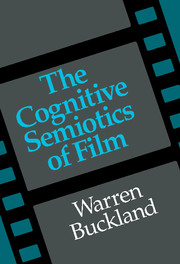Book contents
- Frontmatter
- Contents
- Preface and Acknowledgements
- 1 The Cognitive Turn in Film Theory
- 2 The Body on Screen and in Frame: Film and Cognitive Semantics
- 3 Not What Is Seen through the Window but the Window Itself: Reflexivity, Enunciation, and Film
- 4 The Institutional Context: A Semio-pragmatic Approach to Fiction and Documentary Film
- 5 All in the Mind? The Cognitive Status of Film Grammar
- Conclusion
- Notes
- Bibliography of Works Cited
- Index
Preface and Acknowledgements
Published online by Cambridge University Press: 02 December 2009
- Frontmatter
- Contents
- Preface and Acknowledgements
- 1 The Cognitive Turn in Film Theory
- 2 The Body on Screen and in Frame: Film and Cognitive Semantics
- 3 Not What Is Seen through the Window but the Window Itself: Reflexivity, Enunciation, and Film
- 4 The Institutional Context: A Semio-pragmatic Approach to Fiction and Documentary Film
- 5 All in the Mind? The Cognitive Status of Film Grammar
- Conclusion
- Notes
- Bibliography of Works Cited
- Index
Summary
Two historians meet at a conference. The one asks the other: “What do you think are the main consequences of the French Revolution?” To which the other responds: “It is too early to tell.” In this book I argue that it is still too early to tell what are the consequences of another revolution – the rise of the Language Analysis tradition, whose origins are to be found in the work of Saussure, Peirce, Wittgenstein, and so on, at the beginning of the twentieth century. As is well known, the Language Analysis tradition has already had a decisive impact on the formation and development of modern (or ‘contemporary’) film theory from the sixties onwards. One reason it is still too early to determine the consequences of the tradition is that the revolution it inaugurated is not complete. The main characteristic of this tradition is that it opposes the philosophy of consciousness, which dominated Western thought from the seventeenth century up to the work of the British idealists at the end of the nineteenth century. The Language Analysis tradition challenged the idealism inherent in the philosophy of the subject and replaced it with a new mentalité that reorients thinking toward language and other semiotic systems.
The conflict between the Language Analysis tradition and the philosophy of the subject can be understood today as a conflict between linguistics and cognitive science (or non-linguistic areas of congnitive science).
- Type
- Chapter
- Information
- The Cognitive Semiotics of Film , pp. ix - xiiPublisher: Cambridge University PressPrint publication year: 2000



